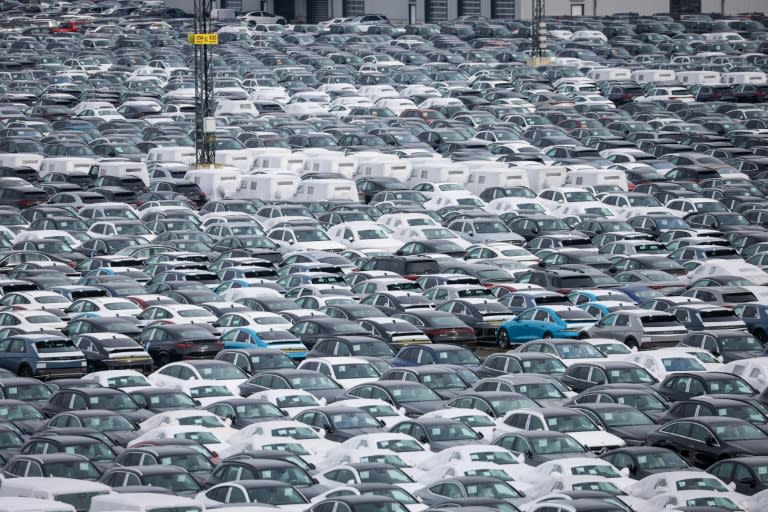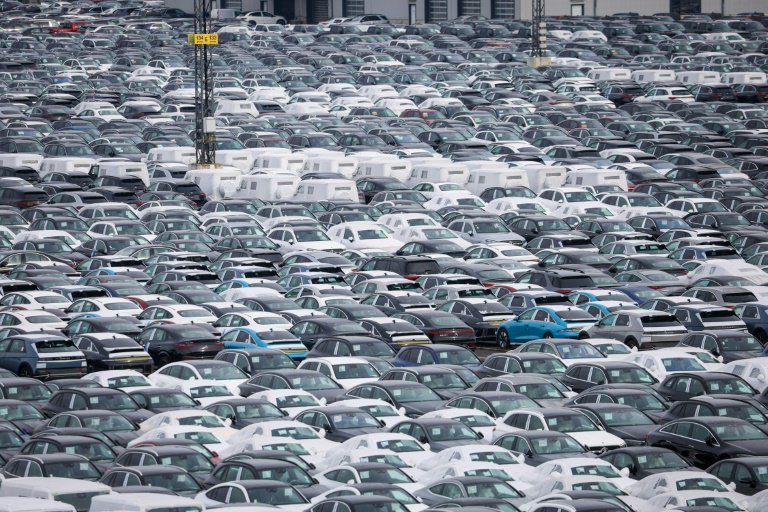
While the EU wants to slow down competition from Chinese electric cars, European car manufacturers are stuck in second gear.
The German group Volkswagen, BMW, Mercedes and Stellantis, a giant of fifteen brands that also includes Jeep, Fiat and Peugeot, have all issued profit warnings in recent weeks.
Weaker demand for their cars in China, where the economy is slowing, and increasing competition from cheaper Chinese electric cars elsewhere are among the biggest hurdles for European carmakers, which employ 2.4 million people.
In a divided vote, EU countries gave the final green light on Friday for significant additional tariffs on electric cars made in China.
The aim is to protect Europe’s auto industry, but opponents, including the German government and the country’s top automakers, fear the move could backfire.
– ‘Serious danger’ –
The European car industry is in “great danger,” Luc Chatel, chairman of the French auto industry trade group PFA, told the French Senate on Wednesday.
New car registrations rose just 1.4 percent to 7.2 million units in the first eight months of the year, keeping volumes low since the outbreak of the Covid pandemic in 2020.
High prices at dealerships and a sluggish economy have deterred consumers from buying new cars, analysts say.
“Auto sector performance in the coming weeks and months will be limited by deteriorating fundamentals until 2025,” UBS analysts said in a note.
More worryingly, sales of electric vehicles have stalled as the industry faces a 2035 EU deadline to phase out new sales of petrol cars.
EVs accounted for 12.6 percent of car sales in Europe in the first eight months of the year, up from 13.9 percent in the same period in 2023.
Concerned about tougher emissions targets coming into force next year, the European Automobile Manufacturers’ Association (ACEA) last month urged the EU to take “urgent relief measures”.
– VW shock –
In a clear sign of the European industry’s troubles, Volkswagen announced last month that it could close factories in Germany for the first time in its history as it struggles with high costs, Chinese competition and weak demand for electric vehicles.
The German government last month held crisis talks with senior figures from the country’s beleaguered car industry.
But Germany opposes EU tariffs on China, fearing retaliation could hurt carmakers doing business in the world’s second-largest economy.
Ten countries, including France, voted on Friday to impose tariffs of up to 35.3 percent on top of existing 10 percent levies.
Germany was among five that voted against, while 12 countries abstained, paving the way for the European Commission to impose the tariffs.
German Finance Minister Christian Lindner warned the commission against unleashing a “trade war” as he called for a negotiated solution, while VW and BMW made similar pleas.
– Sales battle –
Chinese competition is not the only problem for some companies.
“After two years of double-digit margins, European carmakers are now seeing that when it rains, it rains cats and dogs,” said Kevin Thozet, portfolio manager at asset manager Carmignac.
After posting a series of record quarterly figures, Stellantis on Monday cut its operating profit margin forecast from “double-digit” expectations to somewhere between 5.5 percent and seven percent.
Stellantis has struggled in North America, its cash cow in the past, as U.S. dealers struggle to unload their inventory of expensive cars.
The company has offered promotional offers in recent months, limiting its profit margin.
The weaker performance has trickled down to suppliers such as airbag maker Autoliv and parts maker Forvia, which have also lowered their profit forecasts.
“We have had bad news. We do not see how the market could recover by the end of this year,” said Forvia CEO Patrick Koller.
“We thought combustion engines would compensate for the decline in electric motorization, but that didn’t happen,” he said.
– ‘Great year’ coming up? –
While automotive groups are making healthy margins on fossil fuel cars, they still face significant investment in developing electric vehicles, which are not selling fast enough.
Several companies have lowered their electrification targets in favor of hybrid cars, sales of which have soared.
Despite the sector’s setbacks, battery-electric cars will reach a market share of 20 to 24 percent in Europe next year, according to Transport & Environment, a European clean transport advocacy group.
The increase will be partly due to the arrival of seven affordable electric models coming to market this year and in 2025, the group said.
“2025 will be a great year for Europeans in the electric car market,” said Lucien Mathieu, director of T&E Cars.
tsz/abb/lth/gv







